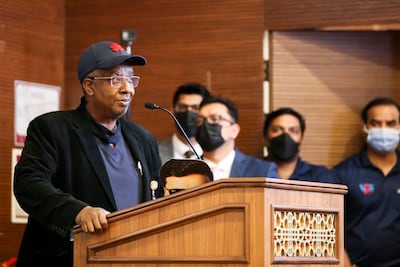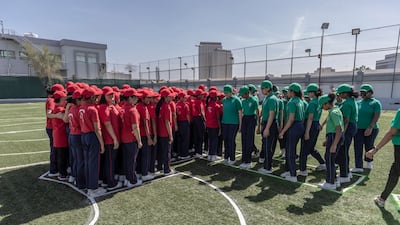Innovative messaging to deliver cancer advice and harnessing the power of social media can help improve the public’s understanding of their health, doctors said.
A recent study of almost 2,300 patients who visited private and public hospitals and clinics across the UAE between January 2019 and May 2020 found that 76 per cent had inadequate or limited health literacy.
The term is characterised by an understanding of how to use information and services to make health-related decisions and is a global marker of health outcomes.
senior vice president of Dubai Science Park
Women were 2.5 times more health literate than men in research conducted by hospitals in Al Ain, Ajman and the Khalifa University College of Medicine and Health Sciences in Abu Dhabi.
Respondents were asked to complete a questionnaire to test their competence in form filling, understanding of medical history and diagnosis, prescriptions and how to take medications correctly.
“Studies across the world show health literacy is important to health outcomes, and helps with prevention,” said Prof Abdel Rahman Omer, chief executive of Burjeel Hospital, Abu Dhabi and a consultant surgeon.
“Covid was an alarm bell, and overall we are better now than before but there is still a way to go.
“Women generally are more health literate than men.
“Pregnancy is a health issue, so many have a good experience of speaking with doctors and monitoring their own health.”
Health literacy is a global issue, and a component of UN sustainability goals to help eradicate poverty and improve the socio-economic status of communities.

In the US, a large-scale survey found just 12 per cent of Americans demonstrated an adequate level of health literacy, while the European Health Literacy survey revealed 47 per cent of respondents had limited health literacy.
Burjeel Hospital is tackling the issue by encouraging patient focus groups to discuss health care, and through question-and-answer sessions with doctors to educate communities.
“Literacy can improve at the school level, with direct or indirect health education, and hospital visits to get them accustomed to a healthcare environment,” said Prof Omer.
“There should be more friendly annual or bi-annual health check-ups for children, like they do for their dental care.
“Social media is a strong tool that can be used to educate children as long as they are shorter than a minute to keep them engaged and provoke curiosity.
“It will help develop public attention in health care.
“The UAE is improving. Better literacy can improve health outcomes and offer preventive measures to develop a healthy nation.”
An innovative method of improving public health literacy is under way at Dubai Science Park.
During colon cancer awareness month, sitting stools situated around the park emblazoned with the caption “Stools Save Lives” offered help with how to get tested and to spot early symptoms of the disease.

Smart stools
Via QR codes, people using the stools can access free consultations and half-price testing at the nearby Neuro Spinal Hospital until April 15.
“The burden of colorectal cancer can be completely prevented through regular screening in its early stages,” said Marwan Abdulaziz Janahi, senior vice president of Dubai Science Park.
“Through this partnership, we aim to increase awareness and encourage people to go for routine check-ups that could save their lives.”
Regular screening is the key to preventing colorectal cancer. Currently, only about four out of 10 patients detect colorectal cancer at an early stage before it spreads.
The campaign aims to encourage the simple detection of colorectal polyps that can take up to 15 years to build, and can develop into cancer.
Colorectal cancer is the third most common cancer globally, but screening across the region is low.
Health literacy for cancer patients plays an important role in improving patient outcomes, experts say.
“We must all work collaboratively to enhance patient care for all cancers,” said Dr Mariam Al Otaibi, from the Gulf Federation of Cancer Control.
“The partnerships between doctors and industry players are critical to controlling cancer in the Gulf region, to raise awareness for colorectal cancer and the factors delaying diagnosis and treatment like the fear of cancer, common cancer myths and misconceptions.”












